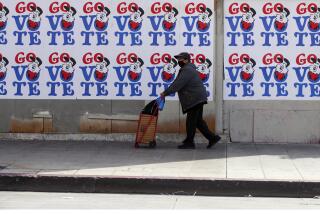The myth of ‘tepid’ support for Villaraigosa
- Share via
The Times’ June 20 analysis of its own poll on the L.A. mayor, “Villaraigosa’s future, once bright, looks dimmer now,” misses the mark. Voters nationally and throughout California are concerned about the direction of their communities and are reluctant to invest additional funds in government programs at a time when the nation is in recession and their personal budgets are stretched. Against the backdrop of voter opinion outside Los Angeles, the city looks like the proverbial city on a hill, and Mayor Antonio Villaraigosa’s ratings would be the envy of chief executives in many jurisdictions.
Voters across the country are concerned about the economy and are unwilling to endorse the job their elected leaders are doing in the wake of the recession. With the exception of President Obama, an approval rating above 50% for any elected official has become a rarity.
Elected officials in California, where the impact of the recession is matched by the impact of budget gridlock, fare no better and perhaps a little worse than average. Gov. Arnold Schwarzenegger’s ratings have fallen to 35% among registered voters in the latest poll by the Public Policy Institute of California, and the Legislature has an approval rating of 16%. The latest Survey USA polling shows both of California’s U.S. senators with approval ratings in the high 40s.
Against the backdrop of public concern, The Times’ analysis is misleading. The poll found (and there is reason to believe the number is conservative) that Villaraigosa enjoys the approval of the majority -- 55% -- of registered voters in Los Angeles. The article characterizes the result as “tepid,” when in reality Villaraigosa is one of the most popular elected officials in his jurisdiction in California.
The reporting on Villaraigosa’s prospects as a gubernatorial candidate, while now moot, seems superficial. A plurality of voters believed he should not run, but that arithmetically must include many who approve of Villaraigosa’s tenure as mayor and therefore wish him to remain as such, a decision the mayor himself has now made.
The Times’ analysis is oddly dismissive of the broad ethnic coalition that makes up the mayor’s 55% majority approval and of the considerable accomplishment of building multiethnic support for the Los Angeles Police Department.
The deep racial divides in opinions of the police department are gone. Indeed, pollster Stanley Greenberg notes in the release of the poll on his own company’s website, “Results reveal that voters in Los Angeles are giving the LAPD its highest approval rating ever since the Los Angeles Times began asking the question in 1991. Unlike polling in the aftermath of Rodney King, the strong support for the police department is near equal across racial lines, with black and Latino voters approving of the job being done by the department nearly as strongly as white voters.”
The lack of racial division on the police (as well as the city’s lower crime rate) seems a testament to racial coalition building. The Times’ analysis instead misleadingly justifies its criticism of the broad coalition approving of Villaraigosa’s performance by noting, “A narrow plurality of white voters gave him negative grades.”
The analysis of the poll makes disturbing presumptions about the nature of registered voters in the city. In fact, 29% of registered voters in the city have Latino surnames, and marriage and surnames that are not coded as Latino would add an estimated 5% or 6% to that base. Adjusting for the undercount of Latinos in Los Angeles would add to Villaraigosa’s already high approval rating. In the context of modern-day Los Angeles, therefore, Villaraigosa enjoys high approval that crosses racial and ethnic lines and has eradicated some of the formerly deep divides that have contributed to a city populace that trusted neither elected officials nor law enforcement. He earns praise for his management of the police and efforts to increase the number of officers.
Voters in Los Angeles, as elsewhere, look for change and further progress in the years to come, but most -- measured across ethnic lines -- approve of the job Villaraigosa has done thus far as mayor of Los Angeles.
Diane T. Feldman is president of The Feldman Group Inc., a strategic political research and polling firm based in Washington. She has worked with Villaraigosa since his 2003 campaign for L.A. City Council.
More to Read
A cure for the common opinion
Get thought-provoking perspectives with our weekly newsletter.
You may occasionally receive promotional content from the Los Angeles Times.










